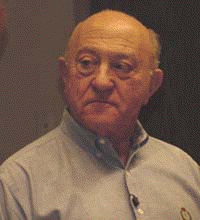By
Samantha Fredrickson
Zephyr Staff
Published
Nov. 7, 2002
 Joseph Kempler paused
as he looked at a picture of a man so thin that
his spine was showing through his stomach.
Joseph Kempler paused
as he looked at a picture of a man so thin that
his spine was showing through his stomach.
"This
is about 60 pounds," Kempler said. "This is about
what I weighed when I was freed from the
concentration camps."
After
spending three years in concentration camps,
Kempler was less than 24 hours away from
starvation the day the American troops liberated
the prisoners.
"We
were lying there dead pretty much," he said. "We
couldn't move."
Kempler,
74, spoke to University of Nevada, Reno students
while being filmed for a documentary by PBS.
The
documentary, with the working title "Knocking," is
an attempt to portray how Jehovah's Witnesses were
persecuted during the Holocaust.
Kempler,
who was raised Jewish, remembers seeing Jehovah's
Witnesses in the camps. Years after the war, he
decided to become a Jehovah's Witness himself.
Co-producer
and co-director of the film, Joel Engardio, said
Jehovah's Witnesses were among the first group of
individuals to be persecuted by Adolf Hitler.
Even
though they were a small group, Hitler found them
very irritating because they were opposed to his
stance. By 1935, the religion was banned and
Jehovah's Witnesses who defied this were
imprisoned in concentration camps, he said.
"They
were the only voluntary prisoners of the
Holocaust," Engardio said. "Since they were Aryan,
the so-called 'master race', they were offered a
declaration card to sign. If they pledged their
allegiance to Hitler, they could be free to
leave."
Kempler
said he was amazed by the Jehovah's Witnesses he
met in the camps because they all refused to sign
anything that would free them.
"They
could always take this way out," he said. "But
they wouldn't."
After
the war, Kempler met Jehovah's Witnesses again
when he found his sister, his only relative who
was still alive.
She
had been saved by a family of Jehovah's Witnesses,
he said, and hidden away from the Nazis for two
years.
"Jehovah's
Witnesses kept coming up in my life," he said.
Then
in the mid 1950's, he converted to the religion
when a group of Jehovah's Witnesses came knocking
at his New York City apartment.
He
remembered them from the camps. And he remembered
them as being the people who kept his sister
hidden away. So he let them in.
"When
I met Jehovah's Witnesses I saw they were not
damaged," he said. "They were still intact. How
could they survive without the suffering and
mental damage I had?"
"People
can survive without shutting down and come back
stronger than before," he said.
There
was no emotion in Kempler's voice when he spoke
about the concentration camps. He spoke of the
cold nights without blankets and the long days of
working in the snow without shoes. But never once
did his eyes water or his voice waiver.
His
feelings were hidden away so deep, he said, that
he felt completely detached from the reality.
Even
on the day he was liberated, he said he felt no
joy because he was too numb.
"We
were no longer humans," he said.
In the
attempt to survive, many prisoners resorted to
cannibalism by cutting the flesh off of dead
bodies.
"Survivalism
was more important," he said. "The only thing was
to survive."
.
![]()
 Joseph Kempler paused
as he looked at a picture of a man so thin that
his spine was showing through his stomach.
Joseph Kempler paused
as he looked at a picture of a man so thin that
his spine was showing through his stomach.